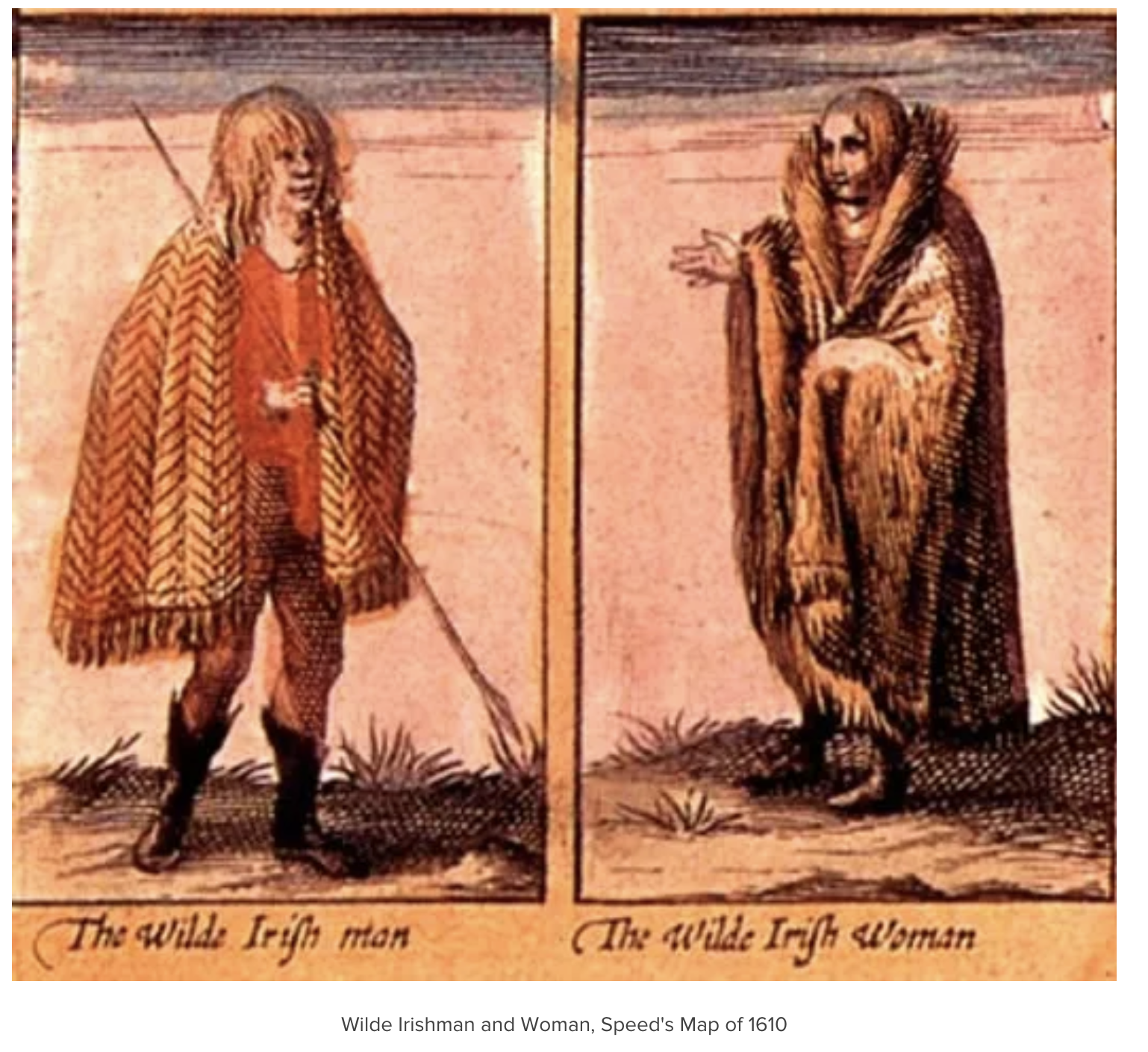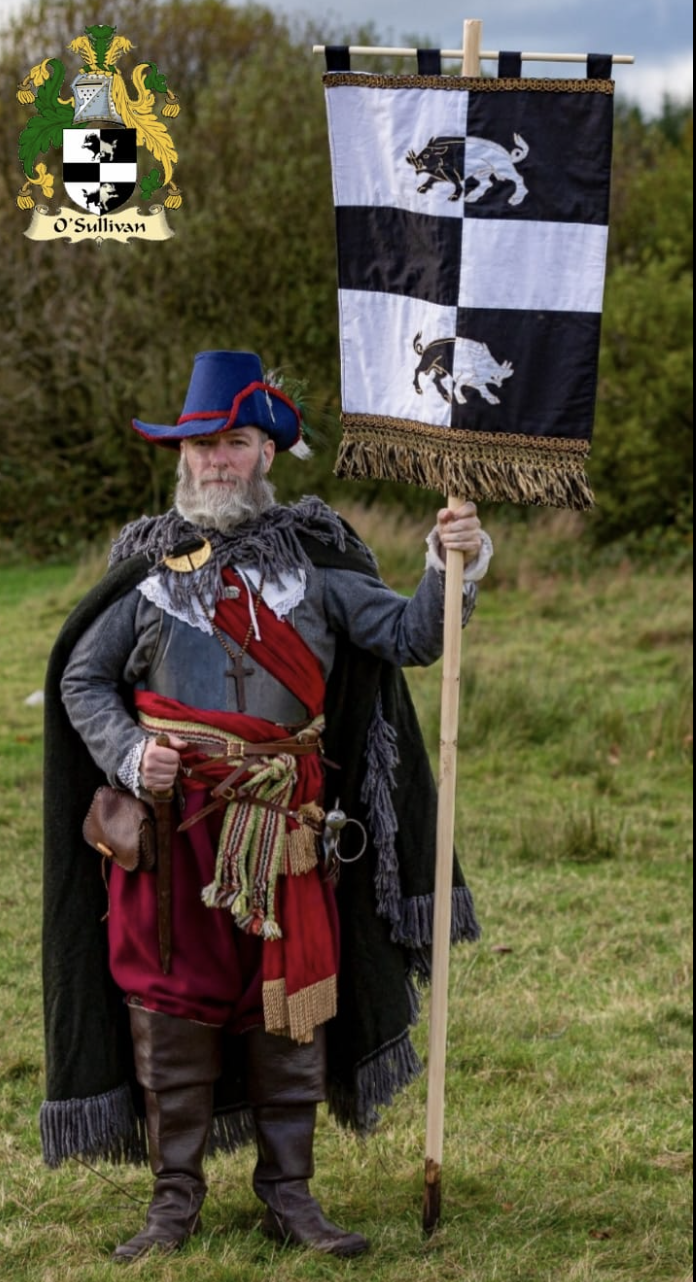What was our Clan Chief Wearing in 1600?
 |
| Created by CH and ChatGPT |
Having discovered that our surname links us to an ancient Irish clan, I have often wondered what our clan chief would have looked like?
I suppose in my mind he would have looked like the image here to the left...... but how accurate is this image????
I know very little about the origins of our clan. What little I do know I shared in a previous blog Link to previous post
The first clan chief to be mentioned in a document (to my current knowledge) is Thady O Hingerdell "called O Hingerdell" i.e. he is the clan chief. He is found in a list of other clan leaders from the Cork area in a government decree called a Fiant (Fiant 3038) for 1577. They had been granted a pardon from the Crown with the payment of a fine of one cow.
I do not know Thady's age in 1577, but the next mention of a chief for our clan is in relation to The Great March of the O'Sullivans on New Years Eve 1602. Is Thady still the clan chief?
To find out more about the Great March read the following post Link to previous post
A skirmish is described in a detailed account of the March written a few years after the event by the nephew of the leader of the March, Donal Cam O'Sullivan Beare.
The skirmish took place after the March had crossed the Shannon River in northern Tipperary. It is reported that one Donagh O'Hinguerdel cut off the right hand of one of the leaders of the royalist attackers. The tide of battle turned and the O'Sullivans and their supporters won the day and moved on towards safety in Leitrim Fort.
Was Donagh now the clan leader? Or a close relation of Thady?
He must have had some status as only the leaders are named in the account of the March, he is up the front of the fight and has a sword (rather than just a pike).
Whatever was his first name, we know that the clan chief was one of the few (35 survivors out of 1000 who set out) who made it to Fort Leitrim. The clan chiefs had to go into hiding and were dismayed to find that no pardons were to be granted. Instead they fled to the port of La Caruna in Galicia, Spain where they applied to the King of Spain for pensions.
For more detailed information and references about the O'Hingerdils in the Spanish court see Link to earlier post
In the application for a pension, the third applicant listed is our clan chief, simply called O Hingurdil, so we do not know his first name.
The next applicant is his brother Dionissio (Denis)
Pensions were allocated and many of the petitioners took up posts as mercenaries for the King of Spain.
In a royal order of 25 August 1607 it was specified that Dionisio Ohingerdel's salary of 18 crowns was to be paid from the funds of the army of Galicia with which he was serving.
That document describes him as:
'thirty years of age, of good build, brown beard, with a scar close to the left eye.'
So, while we don't have a description of our clan chief we do have this description of his brother and in my mind Denis looked something like this:
 |
| Created by CH and ChatGPT |
But just how accurate is my image? What would our clan chief and his brother have really looked like around 1600?
A Google search about clothing styles in Ireland in 1600 took me down many a rabbit hole and it seems that my images may not be completely accurate.....
It seems that they probably looked more like this:
 |
| reference needed XXXXX |
Unfortunately the few contemporary images available to us were created by foreigners and not by the Irish themselves. Sometimes they reflected the biases of the illustrator or served a political purpose. i.e. to show how barbaric/uncivilised the Irish were.
However, there are similarities across the images and one can discern the basic elements of the clothing style of the time.
Some of the best descriptions of the Irish style are detailed in the laws restricting "Irish" clothing that were passed, especially in the time of Henry VIII. These laws were aimed at both the Anglo-Irish and the native Irish.
- Men had to wear a hat on Sunday- many adopted a beret or simple felt hat.
- The 'Glib' hairstyle was banned- twice! (Like a reverse mullet - long dreadlocks in front, short back and sides.)
- Dying with saffron was banned.
- Limits were placed on how much fabric could be used in the Leine/shirt.
- The Brat was banned.
The laws were more successfully administered in the towns and cities where the Crown had control. Little changed for the folk of the countryside far from the reaches of the English authorities.
The laws did however have a devastating effect on Irish exports of items such as the Brat which had been exported all over Europe.
Maybe he sported a thick moustache, a Glib hairstyle and a fringed Brat like this well turned out Irish gent....
or maybe he looked more like these re-enactments of a clan member around 1600 by the current O'Sullivan clan chief Conchobhar O Suilleabhain.
Link to O'Sullivan Clan Website
Link to O'Sullivan FaceBook group
But if that was what was being worn as normal day wear, what did the soldiers wear for battle?
It seems that they pretty much wore their day wear into battle with the addition of a shield (wicker or wood and leather), a few pikes or spears and, if they were wealthy enough, a sword.
On their website Wilde Irish, a group of American men with an interest in this period of Irish history have taken great pains to research and re-produce battle dress of the era, including sword styles etc.
Link to Wilde Irish website and blog
But our man is a clan chief, he would not have been wearing the same as the run of the mill foot soldier would he???
Maybe our clan chief was attired more like this for battle.
Note the ring pommel sword, the tight trews, simple shoes and the deeply fringed Brat.
The patterned hat and armour(?) have had many words written about them- Were they fabric? Leather? Metal? The current consensus seems to be that they were fabric or leather.
 |
| Conchobhar O Suilleabhain |



















Thanks for the lovely read. I’ll keep an eye on the following posts that come after this one. May the presence of the Lord forever be with you.
ReplyDelete